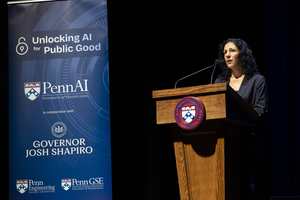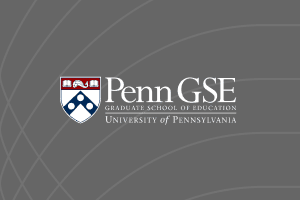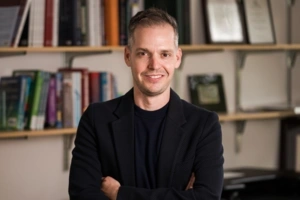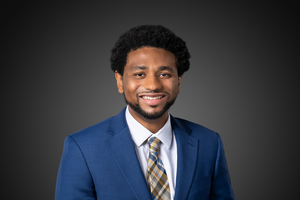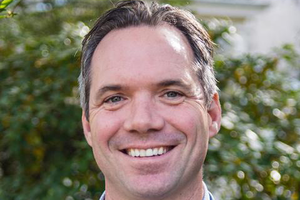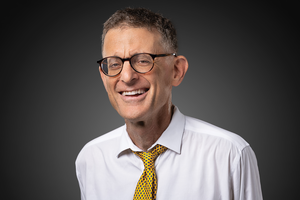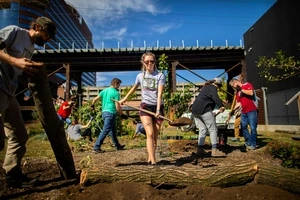When Colby Woods, a doctoral student in the Education Policy program at Penn GSE, learned he had been chosen as a 2025–2026 Perry World House Graduate Fellow, he saw an opportunity to engage his research in K–12 education with some of the most pressing global issues of our time.
“I first heard about the Perry World House Graduate Fellows Program from my advisor, Michael Gottfried,” Woods said. “Now that I have finished my coursework, it felt like a great opportunity to apply my skill set to different issues in different contexts, collaborate with other graduate students I might not have otherwise met, and think a little bit more broadly about how my research can be applied to questions beyond the United States.”
Woods’s path to Penn GSE was shaped by a blend of international and domestic experiences. As an undergraduate at the University of Mississippi, he pursued international studies with a focus on international governance and politics. After graduation, he lived in Germany as a Fulbright English Teaching Assistant before returning to the United States to deepen his research skills.
At Penn GSE, Woods has concentrated on using educational data to better understand the challenges facing schools and districts. His research spans student absenteeism and discipline, career and technical education (CTE) course-taking and its relationship to labor markets, and teacher satisfaction. A significant portion of his work involves partnerships with local and state education agencies, including his past role with the Tennessee Education Research Alliance, a research-practice partnership between Vanderbilt University and the Tennessee Department of Education.
“Currently, I am working on various projects that attempt to unpack reasons for absenteeism, particularly in rural contexts in the United States,” Woods explained. “From my past experience, I have seen the value of bringing stakeholders from a variety of backgrounds and experiences together to make the work better and more relevant.”
The Perry World House Graduate Fellows Program is designed to complement Penn students’ academic experiences by providing skills and networks that connect scholarship to policy. Fellows engage in small group seminars, learn to apply open-source intelligence and satellite data, and take part in a crisis simulation exercise, all while exploring pressing international issues such as foreign policy, national security, climate change, and human rights.
Woods views this as a chance to both grow personally and contribute meaningfully.
“I hope the program pushes me out of the comfort zone of my academic discipline, helps me apply my skill set to more global problems, introduces new methodological approaches, and supports me in building an interdisciplinary community of scholars,” he said.
For Woods, collaboration is central to both education policy and global affairs. He is eager to share his ongoing work on rural absenteeism with peers from other disciplines, but he is equally excited to learn from their approaches.
“In the true spirit of studying education, my research has made me curious, inquisitive, and encouraging,” Woods reflected. “Ultimately, research is not about being right or the best. It is about the process of demonstrating a truth and acknowledging its limitations.”
One of the first activities of the fellowship year is a full-day crisis simulation, an immersive policy exercise that Woods says he has never experienced before. “What better way to really get to know each other as people and researchers?” he said.
Although his current projects focus on American education, Woods sees clear connections between his research and the global mission of Perry World House.
“The four thematic pillars of Perry World House are democracy, climate change, global justice, and human rights,” he said. “I am particularly interested in exploring the intersection of human rights and democracy. We live in a time of increasing persecution, where democratic institutions across the globe are using their authority to restrict, rather than protect, marginalized groups. Educational institutions are meant to be key democratic institutions, but increasingly, we are seeing people pushed out rather than brought in. We need to see strength in each other’s differences, rather than fear them.”
One of the aspects of the fellowship that excites Woods most is the chance to connect with graduate students from across Penn.
“One of the great things about Penn is that there are more full-time graduate and professional students than full-time undergraduates,” he said. “Getting to pull students out of their offices and labs from across campus to build an academic community is truly a feat. All of the Graduate Fellows have the opportunity to represent themselves — their backgrounds, expertise, and interests — but also their academic disciplines: how questions are asked, what methods are commonly used, and what philosophies guide the work.”
Woods hopes to be an active connector, sharing Perry World House opportunities with classmates and colleagues who might not otherwise encounter them.
Being at Penn GSE, Woods believes, gives him a distinctive lens for engaging in policy discussions that stretch far beyond education.
“As John Dewey wrote in Democracy and Education, ‘In directing the activities of the young, society determines its own future in determining that of the young,’” he noted. “A country reveals its values in how it designs its educational system and delivers education. If you want insight into how a society is thinking about climate change, human rights, security, and democracy broadly, looking at the education system is a great place to start.”
As he enters the fellowship year, Woods is excited to grow as both a scholar and a collaborator.
“After participating in the program, I intend to continue working to bridge the gaps among research, policy, and practice with a broader focus beyond the American educational system,” he said. “Going forward, I am excited to take ownership of my own research projects that generate opportunities for others, both locally and globally, and ultimately improve the experiences of students and teachers across the globe.”
For Woods, the fellowship is as much about mindset as it is about methods. “Your fear of looking stupid is holding you back,” he said, sharing a phrase that has guided him throughout his educational journey. “Educational settings are one of the few spaces where it’s acceptable, even encouraged, to not know everything. I’m excited to be in an environment where I can challenge myself, ask questions, and help others.”
Media Inquiries
Penn GSE Communications is here to help reporters connect with the education experts they need.

